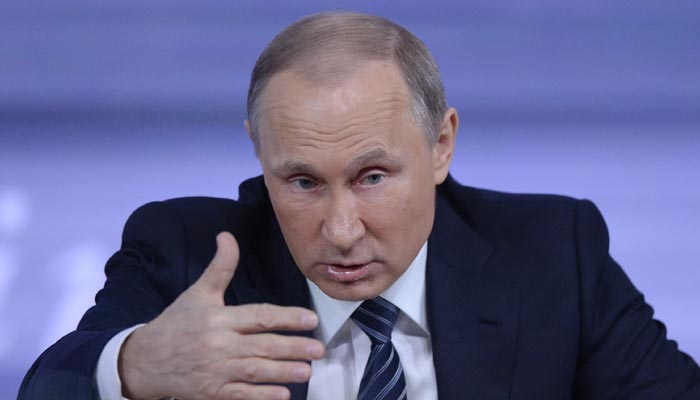Russian President Vladimir Putin speaks during his annual press conference in Moscow on Thursday. Putin fired off an angry tirade against Turkey, ruling out any reconciliation with its leaders.
Reuters/Moscow
Russia's Vladimir Putin subjected Turkey to a furious tirade on Thursday, using barrack-room language to wonder aloud whether it had shot down a Russian warplane last month to curry favour with the US.
Addressing almost 1,400 reporters in a cavernous hall inside a Moscow conference centre, the Russian president dedicated a chunk of his annual news conference to spelling out why he saw no prospect of a rapprochement with Ankara.
"If someone in the Turkish leadership decided to lick the Americans in a particular place I don't know whether they acted correctly or not and I don't know ... whether the Americans needed that," said Putin, referring to the shooting down.
Putin said he could imagine a scenario where there was a deal for Turkey to shoot down a Russian plane in return for Washington turning a blind eye to Turkish troops entering Iraq.
"Perhaps there was such an arrangement," he said.
Turkey's downing of a Russian SU-24 fighter bomber near the Syrian-Turkish border on November 24 prompted Putin to impose economic sanctions on Turkey who he claimed had stabbed Russia in the back.
Turkey said it was acting to defend its airspace. Moscow said its plane had not overflown Turkey.
Putin made clear Russian sanctions would stay in place for some time, saying it was hard for the Kremlin to reach any kind of agreement with the current Turkish leadership, whom he accused of "creeping Islamisation" that would have the secular state's founder, Kemal Ataturk, turning in his grave.
"Maybe, they thought we would run away from there (Syria)? But Russia is not such a country," said Putin.
Putin, speaking on the eve of a meeting of world powers in New York on Friday to discuss Syria, was more conciliatory towards the US, saying he broadly supported US plans to try to push forward the Syrian peace process
Even though differences between Moscow and Washington remained, he said he backed a US plan to prepare a UN resolution on the peace process.
But though he said there was agreement that a new constitution needed to be drawn up and an election held to determine the fate of the conflict-torn country, he signalled Moscow was not yet ready to withdraw its support for Syrian President Bashar al-Assad.
"We believe that only the Syrian people can decide who should govern them," said Putin, saying Moscow would continue its air strikes in Syria for as long as the Syrian army continued its own military operations.
Reassurance on economy
Putin, 63, a former Soviet KGB officer, has ruled Russia as either president or prime minister for 16 years. He has not yet said whether he intends to stand for a fourth presidential term in 2018. If he did, he could remain in power until 2024.
He used the news conference, a set-piece of Russian political life, to try to reassure voters over the troubled state of Russia's economy.
Buffeted by Western sanctions imposed over the Ukraine crisis, falling oil prices, and a weakening rouble, Russia's economy is forecast to shrink by around 4% this year, its sharpest contraction since the global financial crisis.
The crisis has hit ordinary Russians hard, cutting real incomes, pushing up prices of day-to-day products, and halving their buying power in the West. With a ban on direct flights to Egypt and Kremlin sanctions on Turkey, two of their favourite holiday destinations have also been pushed further out of their reach.
"The Russian economy has passed the crisis. At least, the peak of the crisis," said Putin.
Despite the economic pain, polls show Putin's ratings, which were boosted by his decision to annex Ukraine's Crimea last year and to launch air strikes in Syria, remain at around 85%, not far off their record highs of almost 90% in October.
Answering a question about Ukraine - with which relations remained strained over a smouldering conflict in eastern Ukraine and Crimea - Putin appeared to confirm the presence of Russian special forces in east Ukraine for the first time.
"We never said there were no people there who were carrying out certain tasks including in the military sphere," said Putin.
"But that does not mean there are Russian (regular) troops there, feel the difference," he added, saying he now wanted better ties with Kiev overall.
That Russian forces were present in eastern Ukraine will come as little surprise; Reuters reporters have uncovered widespread evidence of their presence. But Putin's words went further than previous statements, in which Russian officials issued blanket denials that Russian soldiers were there.
Putin, who spoke for just over three hours, seemed less relaxed than usual and frequently glanced at a wristwatch he had laid out in front of him.

